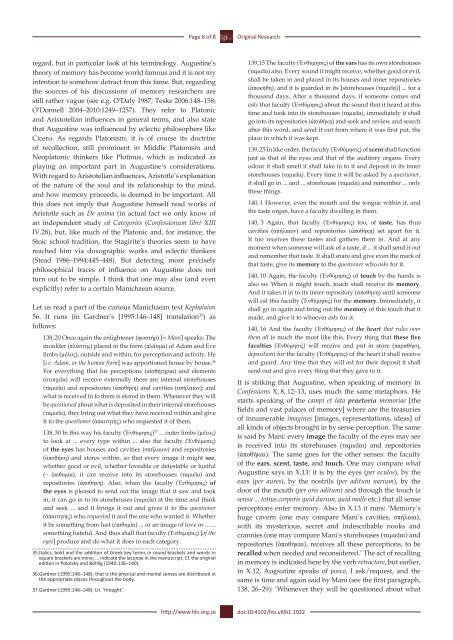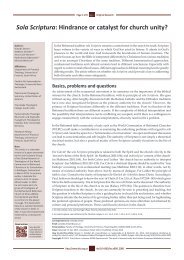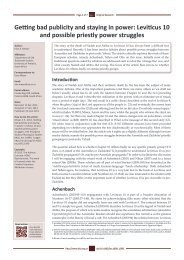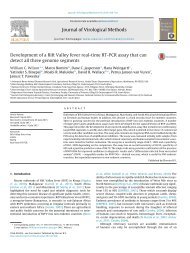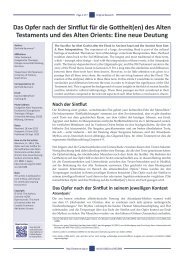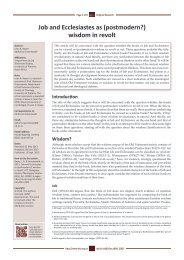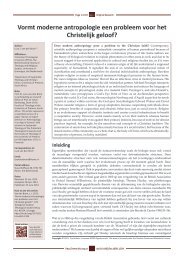A Manichaean analysis of Augustine's Confessions, Book X - HTS ...
A Manichaean analysis of Augustine's Confessions, Book X - HTS ...
A Manichaean analysis of Augustine's Confessions, Book X - HTS ...
You also want an ePaper? Increase the reach of your titles
YUMPU automatically turns print PDFs into web optimized ePapers that Google loves.
Page 6 <strong>of</strong> 8<br />
Original Research<br />
regard, but in particular look at his terminology. Augustine’s<br />
theory <strong>of</strong> memory has become world famous and it is not my<br />
intention to somehow detract from this fame. But, regarding<br />
the sources <strong>of</strong> his discussions <strong>of</strong> memory researchers are<br />
still rather vague (see e.g. O’Daly 1987; Teske 2006:148–158;<br />
O’Donnell 2004–2010:1249–1257). They refer to Platonic<br />
and Aristotelian influences in general terms, and also state<br />
that Augustine was influenced by eclectic philosophers like<br />
Cicero. As regards Platonism, it is <strong>of</strong> course its doctrine<br />
<strong>of</strong> recollection, still prominent in Middle Platonism and<br />
Neoplatonic thinkers like Plotinus, which is indicated as<br />
playing an important part in Augustine’s considerations.<br />
With regard to Aristotelian influences, Aristotle’s explanation<br />
<strong>of</strong> the nature <strong>of</strong> the soul and its relationship to the mind,<br />
and how memory proceeds, is deemed to be important. All<br />
this does not imply that Augustine himself read works <strong>of</strong><br />
Aristotle such as De anima (in actual fact we only know <strong>of</strong><br />
an independent study <strong>of</strong> Categories (Confessionum libri XIII<br />
IV.28), but, like much <strong>of</strong> the Platonic and, for instance, the<br />
Stoic school tradition, the Stagirite’s theories seem to have<br />
reached him via doxographic works and eclectic thinkers<br />
(Stead 1986–1994:445–448). But detecting more precisely<br />
philosophical traces <strong>of</strong> influence on Augustine does not<br />
turn out to be simple. I think that one may also (and even<br />
explicitly) refer to a certain <strong>Manichaean</strong> source.<br />
Let us read a part <strong>of</strong> the curious <strong>Manichaean</strong> text Kephalaion<br />
56. It runs (in Gardner’s [1995:146–148] translation 35 ) as<br />
follows:<br />
138, 20 Once again the enlightener (φωστήρ) [= Mani] speaks: The<br />
moulder (πλάστης) placed in the form (πλάσμα) <strong>of</strong> Adam and Eve<br />
limbs (μέλος), outside and within, for perception and activity. He<br />
[i.e. Adam, or the human form] was apportioned house by house. 36<br />
For everything that his perceptions (αἰσθήτηρια) and elements<br />
(στοιχεῖα) will receive externally there are internal storehouses<br />
(ταμιεῖα) and repositories (ἀποθήκη) and cavities (σπήλαιον); and<br />
what is received in to them is stored in them. Whenever they will<br />
be questioned about what is deposited in their internal storehouses<br />
(ταμιεῖα), they bring out what they have received within and give<br />
it to the questioner (ἀπαιτητής) who requested it <strong>of</strong> them.<br />
138, 30 In this way his faculty (Ἐνθύμησις) 37 ... outer limbs (μέλος)<br />
to look at ... every type within ... also the faculty (Ἐνθύμεσις)<br />
<strong>of</strong> the eyes has houses and cavities (σπήλαιον) and repositories<br />
(ἀποθήκη) and stores within, so that every image it might see,<br />
whether good or evil, whether loveable or detestable or lustful<br />
(– ἐπιθυμία), it can receive into its storehouses (ταμιεῖα) and<br />
repositories (ἀποθήκη). Also, when the faculty (Ἐνθύμησις) <strong>of</strong><br />
the eyes is pleased to send out the image that it saw and took<br />
in, it can go in to its storehouses (ταμιεῖα) at the time and think<br />
and seek ... and it brings it out and gives it to the questioner<br />
(ἀπαιτητής) who requested it and the one who wanted it. Whether<br />
it be something from lust (ἐπιθυμία) ... or an image <strong>of</strong> love or ... ...<br />
something hateful. And thus shall that faculty (Ἐνθύμησις) [<strong>of</strong> the<br />
eyes] produce and do what it does in each category.<br />
35.Italics, bold and the addition <strong>of</strong> Greek key terms in round brackets and words in<br />
square brackets are mine; ... indicate the lacunae in the manuscript. Cf. the original<br />
edition in Polotsky and Böhlig (1940:138–140).<br />
36.Gardner (1995:146–148): that is the physical and mental senses are distributed in<br />
the appropriate places throughout the body.<br />
37.Gardner (1995:146–148): Lit. ‘thought’.<br />
139,15 The faculty (Ἐνθύμησις) <strong>of</strong> the ears has its own storehouses<br />
(ταμιεῖα) also. Every sound it might receive, whether good or evil,<br />
shall be taken in and placed in its houses and inner repositories<br />
(ἀποκήθη), and it is guarded in its [storehouses (ταμιεῖα)] ... for a<br />
thousand days. After a thousand days, if someone comes and<br />
asks that faculty (Ἐνθύμησις) about the sound that it heard at this<br />
time and took into its storehouses (ταμιεῖα), immediately it shall<br />
go into its repositories (ἀποθήκη) and seek and review and search<br />
after this word, and send it out from where it was first put, the<br />
place in which it was kept.<br />
139, 25 In like order, the faculty (Ἐνθύμησις) <strong>of</strong> scent shall function<br />
just as that <strong>of</strong> the eyes and that <strong>of</strong> the auditory organs. Every<br />
odour it shall smell it shall take in to it and deposit in its inner<br />
storehouses (ταμιεῖα). Every time it will be asked by a questioner,<br />
it shall go in ... and ... storehouse (ταμιεῖα) and remember ... only<br />
these things.<br />
140, 1 However, even the mouth and the tongue within it, and<br />
the taste organ, have a faculty dwelling in them.<br />
140, 3 Again, that faculty (Ἐνθύμησις) too, <strong>of</strong> taste, has thus<br />
cavities (σπήλαιον) and repositories (ἀποθήκη) set apart for it.<br />
It too receives these tastes and gathers them in. And at any<br />
moment when someone will ask <strong>of</strong> a taste, if ... it shall send it out<br />
and remember that taste. It shall snare and give even the mark <strong>of</strong><br />
that taste; give its memory to the questioner who asks for it.<br />
140, 10 Again, the faculty (Ἐνθύμησις) <strong>of</strong> touch by the hands is<br />
also so: When it might touch, touch shall receive its memory.<br />
And it takes it in to its inner repository (ἀποθήκη) until someone<br />
will ask this faculty (Ἐνθύμησις) for the memory. Immediately, it<br />
shall go in again and bring out the memory <strong>of</strong> this touch that it<br />
made, and give it to whoever asks for it.<br />
140, 16 And the faculty (Ἐνθύμησις) <strong>of</strong> the heart that rules over<br />
them all is much the most like this. Every thing that these five<br />
faculties (Ἐνθύμησις) will receive and put in store (παραθήκη,<br />
depositum) for the faculty (Ἐνθύμησις) <strong>of</strong> the heart it shall receive<br />
and guard. Any time that they will ask for their deposit it shall<br />
send out and give every thing that they gave to it.<br />
It is striking that Augustine, when speaking <strong>of</strong> memory in<br />
<strong>Confessions</strong> X, 8, 12–13, uses much the same metaphors. He<br />
starts speaking <strong>of</strong> the campi et lata praetoria memoriae [the<br />
fields and vast palaces <strong>of</strong> memory] where are the treasuries<br />
<strong>of</strong> innumerable imagines [images, representations, ideas] <strong>of</strong><br />
all kinds <strong>of</strong> objects brought in by sense perception. The same<br />
is said by Mani: every image the faculty <strong>of</strong> the eyes may see<br />
is received into its storehouses (ταμιεῖαι) and repositories<br />
(ἀποθήκαι). The same goes for the other senses: the faculty<br />
<strong>of</strong> the ears, scent, taste, and touch. One may compare what<br />
Augustine says in X.13: it is by the eyes (per oculos), by the<br />
ears (per aures), by the nostrils (per aditum narium), by the<br />
door <strong>of</strong> the mouth (per oris aditum) and through the touch (a<br />
sensu ... totius corporis quid durum, quid molle etc.) that all sense<br />
perceptions enter memory. Also in X.13 it runs: ‘Memory’s<br />
huge cavern (one may compare Mani’s cavities, σπήλαια),<br />
with its mysterious, secret and indescribable nooks and<br />
crannies (one may compare Mani’s storehouses (ταμιεῖαι) and<br />
repositories (ἀποθήκαι), receives all these perceptions, to be<br />
recalled when needed and reconsidered.’ The act <strong>of</strong> recalling<br />
in memory is indicated here by the verb retractare, but earlier,<br />
in X.12, Augsutine speaks <strong>of</strong> posco, I ask/request, and the<br />
same is time and again said by Mani (see the first paragraph,<br />
138, 26–29): ‘Whenever they will be questioned about what<br />
http://www.hts.org.za<br />
doi:10.4102/hts.v69i1.1922


